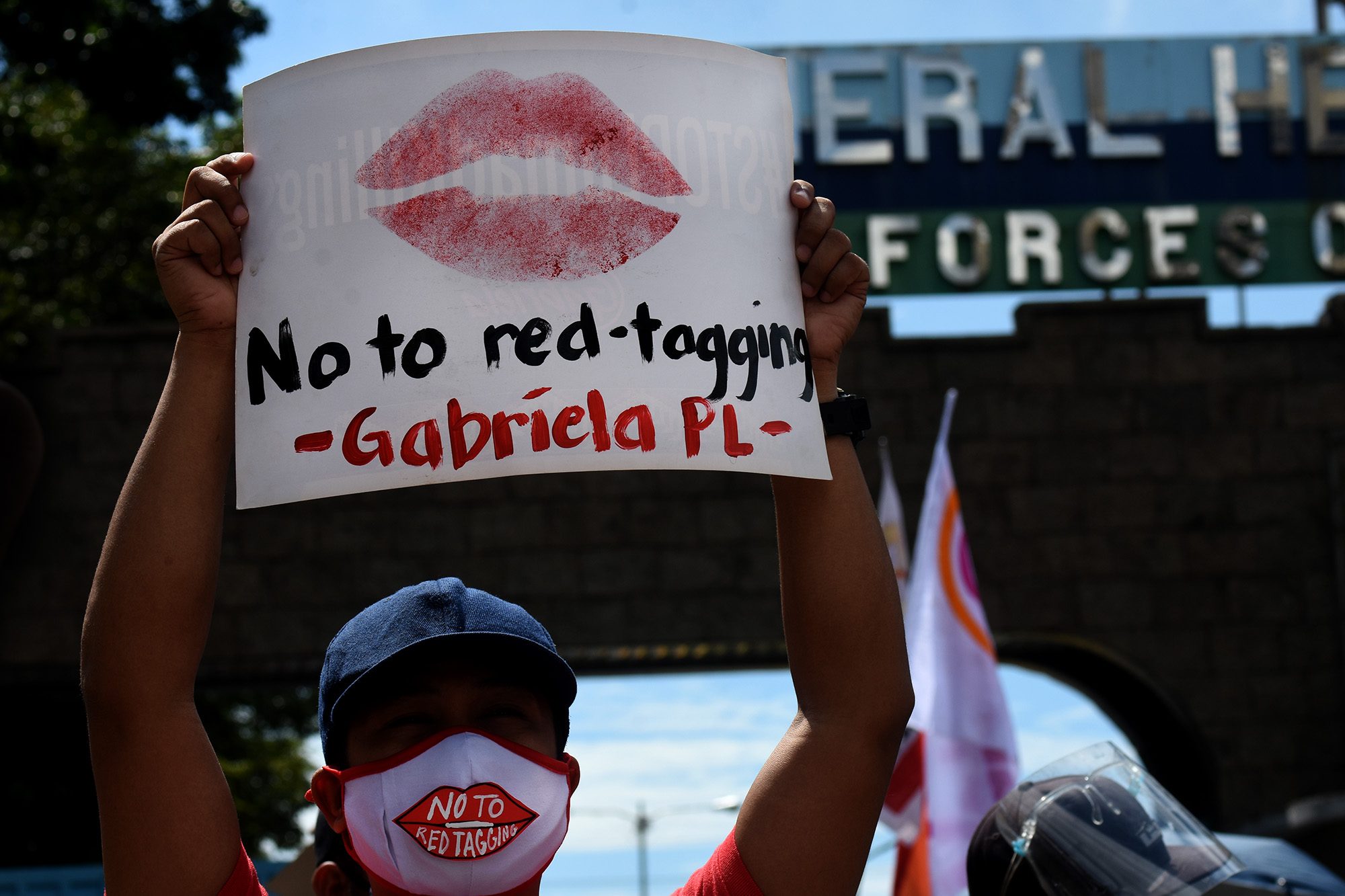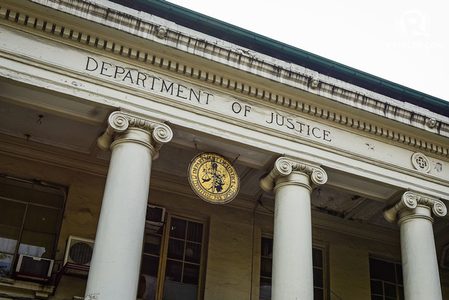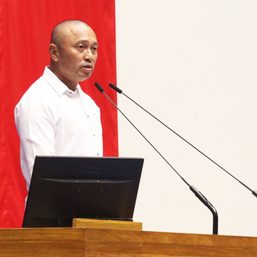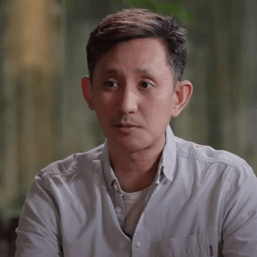SUMMARY
This is AI generated summarization, which may have errors. For context, always refer to the full article.

Justice Secretary Menardo Guevarra said he supports the enactment of a law against red-tagging, adding that “it may help reduce the problem of reckless endangerment.”
“It would be best that the Congress enact a law clearly defining and expressly penalizing what is loosely called today as red-tagging,” Guevarra told reporters on Wednesday, April 28.
Guevarra was asked to react to Deputy House Speaker Rufus Rodriguez’s call for the National Bureau of Investigation (NBI) to investigate the red-tagging of community pantries.
“If the Congress is minded to criminalize red-tagging, it should enact the appropriate legislation. It may help reduce the problem of reckless endangerment. It’s really something for the congress to ponder on,” said Guevarra.
Senator Franklin Drilon, author of a bill criminalizing red-tagging, urged President Rodrigo Duterte on Wednesday to certify his Senate Bill No. 2121 as urgent.
SB No. 2121 defines red-tagging as “any state actor, such as a law enforcement agent, paramilitary, or military personnel, who labels, vilifies, brands, names, accuses, harasses, persecutes, stereotypes, or caricatures individuals, groups, or organizations as state enemies, left-leaning, subversives, communists, or terrorists.”
The bill imposes a penalty of 10-year jail time and perpetual disqualification from public office.
But in the meantime, what can be done in the absence of such a law?
At least 3 approaches have surfaced: strengthen existing writs; pursue alternative legal actions; and further scrutinize the presidential order that created the government’s anti-insurgency task force.
Strengthen protective writs
The Supreme Court can help strengthen existing writs that are available to to the public for their protection, and the Tribunal appears inclined to do this in light of its its current assessment of threats and harm to lawyers.
A petition for the writ of amparo, if granted, would result in privileges that commonly take the form of protective orders. It acts like a restraining order against specific people.
But activists and lawyers have been losing in their amparo petitions, which they blame on recent jurisprudence where labeling is not seen as a direct cause of the harassment being complained about.
National Union of Peoples’ Lawyers (NUPL) chairman Neri Colmenares, who was red-tagged by Solicitor General Jose Calida during the Supreme Court’s oral arguments on Tuesday, April 27, said the Court must relax its rules on amparo petitions.
“The judiciary looks at the writ of amparo through the lens of criminal law, where the evidence of the victim must be like proof beyond reasonable doubt or high quantum of evidence to prove who is the person [making the threats],” said Colmenares. It’s a challenge to pinpoint the people behind red-tagging posters, fliers and social media posts, he said.
Colmenares pointed out that amparo is not a criminal action that results in jail time, nor is it a civil suit that ends with the payment of damages. He said the Supreme Court can put more teeth in the amparo by issuing stronger warnings.
“The Court can always issue a general writ saying this person is protected and any attacks on this person, with the full force of the law, we’ll make sure we’ll go after you and search for you,” said Colmenares.
In instances where a state agent is identified as behind the labeling, Colmenares said “the Court can issue immediately a writ telling the general to stop his red-tagging.”
Recently, a court in Baguio ordered local policemen to cease and desist from making any social media posts that labeled progressive youth organizations as communists. The local court did that as a preliminary action, without actually issuing an injunction.
Communism is not a crime in the Philippines. Communist rebels are prosecuted and tried for rebellion or terrorism, while activists that the government links to communist rebels are charged with common crimes such as illegal possession of firearms and explosives.
Alternative legal actions
The Duterte government has sparked a new legal offensive against red-tagging, with groups like Bayan Muna, NUPL and Karapatan filing creative suits.
National Task Force to End Local Communist Armed Conflict (NTF-ELCAC) spokesperson Lieutenant General Antonio Parlade Jr has been sued at the Office of the Ombudsman for graft, crimes against humanity by persecution, and violation of Section 55 of the Administrative Code that bars soldiers from “engaging directly or indirectly in any partisan political activity.”
The Ombudsman has the power to suspend and/or fire officials, even preventively, but no such action has been done on this matter.
NUPL president Edre Olalia said they are “still iffy” to sue for cyber libel, given their questions on the constitutionality of the contentious law that was passed in 2012.
“We are still iffy of the unintended implication that it might be misconstrued as an acquiescence or even conceding the constitutional and legal challenges we raised then,” Olalia said.
Free Legal Assistance Group (FLAG) chairperson Chel Diokno suggested the civil route. Victims could seek for damages invoking Articles 19, 21, and 32 of the Civil Code, which all involve ethical and moral conduct toward other people.
Colmenares said the Philippine justice system must acknowledge that red-tagging has negative effects on the security and liberty of a person.
“Sticks and stones may break my bones, but words will never hurt me? No, in the Philippines, words kill. The vilification of drug suspects, the red-tagging of supposed CPP-NPA, they all lead to many deaths,” said Colmenares.
Question EO 70
The NTF-ELCAC was created by Duterte in December 2018 through Executive Order No. 70, “institutionalizing a whole-of-nation approach in attaining and sustainable peace.”
It was mandated to formulate and start a national peace framework that will “address the root causes of insurgencies, internal disturbances and tensions as well as other armed conflicts and threats in identified areas.”
The NUPL-National Capital Region said EO 70 is sweeping and vague. “Void for vagueness” is a legal principle where statutes and other documents which are vaguely-worded are considered void.
“EO 70 is impermissibly vague and lacks the sufficient minimal standards which allows the NTF ELCAC to exercise unlimited power and discretion,” said NUPL-NCR’s Alnie Foja and Minerva Lopez.
“EO 70 and the NTF ELCAC do not target communists involved in the armed conflict but the broad opposition movement which includes unarmed civilians,” said Folja and Lopez.
The lawyers added that EO 70 violates the principle of separation of powers because Duterte essentially created another public office, when this act should have been done by Congress.
NTF-ELCAC’s budget is charged against its member-agencies, but Commission on Audit (COA) chairman Michael Aguinaldo told the House last year that it would be hard to track of the funds.
Parlade’s relentless red-tagging, particularly of community pantries, have prompted new calls to defund the task force.
– Rappler.com
Add a comment
How does this make you feel?

![[PODCAST] Law of Duterte Land: How to legally fight red-tagging](https://www.rappler.com/tachyon/2020/12/Law-of-DuterteLand-1280.jpg?fit=449%2C449)










There are no comments yet. Add your comment to start the conversation.